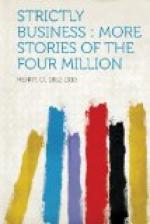They came out of the West together, where they had been friends. They came to dig their fortunes out of the big city.
Father Knickerbocker met them at the ferry, giving one a right-hander on the nose and the other an upper-cut with his left, just to let them know that the fight was on.
William was for business; Jack was for Art. Both were young and ambitious; so they countered and clinched. I think they were from Nebraska or possibly Missouri or Minnesota. Anyhow, they were out for success and scraps and scads, and they tackled the city like two Lochinvars with brass knucks and a pull at the City Hall.
Four years afterward William and Jack met at luncheon. The business man blew in like a March wind, hurled his silk hat at a waiter, dropped into the chair that was pushed under him, seized the bill of fare, and had ordered as far as cheese before the artist had time to do more than nod. After the nod a humorous smile came into his eyes.
“Billy,” he said, “you’re done for. The city has gobbled you up. It has taken you and cut you to its pattern and stamped you with its brand. You are so nearly like ten thousand men I have seen to-day that you couldn’t be picked out from them if it weren’t for your laundry marks.”
“Camembert,” finished William. “What’s that? Oh, you’ve still got your hammer out for New York, have you? Well, little old Noisyville-on-the-Subway is good enough for me. It’s giving me mine. And, say, I used to think the West was the whole round world—only slightly flattened at the poles whenever Bryan ran. I used to yell myself hoarse about the free expense, and hang my hat on the horizon, and say cutting things in the grocery to little soap drummers from the East. But I’d never seen New York, then, Jack. Me for it from the rathskellers up. Sixth Avenue is the West to me now. Have you heard this fellow Crusoe sing? The desert isle for him, I say, but my wife made me go. Give me May Irwin or E. S. Willard any time.”
“Poor Billy,” said the artist, delicately fingering a cigarette. “You remember, when we were on our way to the East how we talked about this great, wonderful city, and how we meant to conquer it and never let it get the best of us? We were going to be just the same fellows we had always been, and never let it master us. It has downed you, old man. You have changed from a maverick into a butterick.”
“Don’t see exactly what you are driving at,” said William. “I don’t wear an alpaca coat with blue trousers and a seersucker vest on dress occasions, like I used to do at home. You talk about being cut to a pattern—well, ain’t the pattern all right? When you’re in Rome you’ve got to do as the Dagoes do. This town seems to me to have other alleged metropolises skinned to flag stations. According to the railroad schedule I’ve got in mind, Chicago and Saint Jo and Paris, France, are asterisk stops—which means you wave a red flag and get on every other Tuesday.




